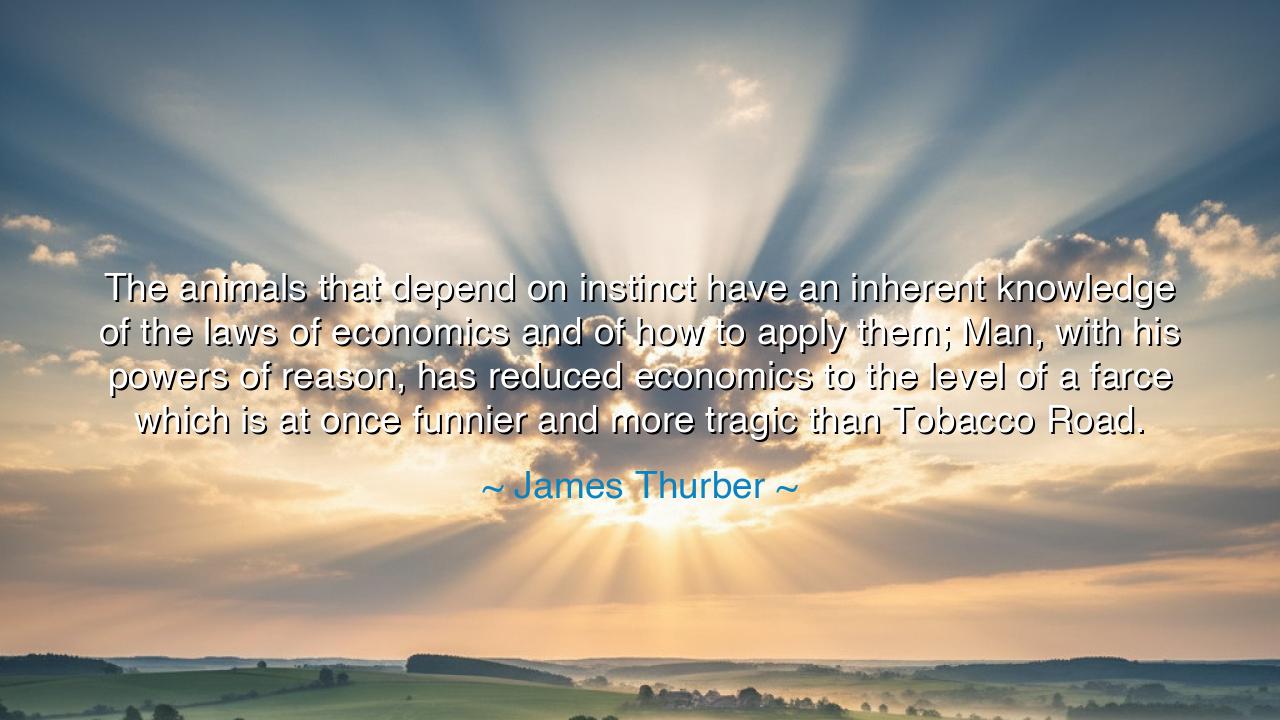
The animals that depend on instinct have an inherent knowledge of
The animals that depend on instinct have an inherent knowledge of the laws of economics and of how to apply them; Man, with his powers of reason, has reduced economics to the level of a farce which is at once funnier and more tragic than Tobacco Road.






Hear now the words of James Thurber, the satirist who clothed truth in laughter: “The animals that depend on instinct have an inherent knowledge of the laws of economics and of how to apply them; Man, with his powers of reason, has reduced economics to the level of a farce which is at once funnier and more tragic than Tobacco Road.” In this utterance he unveils a paradox: that creatures without reason often live in harmony with the eternal balances of life, while humankind, boasting intellect, has turned the ordering of resources into folly, chaos, and greed. The beasts, guided by instinct, consume what they need, take only their portion, and preserve the balance of nature. Yet man, with his reason corrupted by desire, multiplies wants, distorts markets, and makes of economics a tragic comedy.
The animals know the laws of sufficiency. The lion kills only until his hunger is satisfied, then leaves the carcass to vultures and hyenas, ensuring nothing is wasted. The beaver builds his dam for shelter, not vanity; the ant gathers for the winter, never for luxury. In them, Thurber saw a hidden wisdom: an inherent knowledge of balance, efficiency, and survival. Their world is harsh, yet it is ordered. Their instincts do not betray them, for they are aligned with the natural law.
But man, armed with reason, has taken these simple and eternal laws and twisted them into systems that often bring ruin. He hoards beyond need, builds palaces while neighbors starve, and manipulates markets until wealth piles in few hands while the many languish. In his wit, Thurber compared this to Tobacco Road, a novel and play depicting crushing poverty and folly in America’s South, where human failings—greed, waste, shortsightedness—turned survival into suffering. Thus, what should have been the crowning gift of humanity, the power of reason, becomes the instrument of imbalance and tragedy.
History offers many examples. Consider the Great Depression of the 1930s. The earth was fertile, factories full, and hands eager to work—yet millions starved. Why? Because economics, that discipline meant to order human need, had been corrupted by speculation, excess, and greed. Contrast this with the natural order of the forest, where no fruit goes uneaten, no creature labors without purpose. Nature wastes little, but man, through distorted systems, created famine in the midst of plenty. Here Thurber’s words cut deeply: our reason, untempered by wisdom, often brings ruin where instinct alone would have brought balance.
Yet his words are not only satire—they are a call to humility. They remind us that for all our intelligence, we must learn again from the instincts of animals, from the simple laws of nature. Economics at its heart is not about hoarding wealth or manipulating numbers, but about survival, sufficiency, and the flourishing of communities. To forget this is to turn a science into a farce, and progress into tragedy.
The lesson, then, is clear: let our reason return to alignment with nature’s balance. Let us take what we need, share what we can, and design systems that sustain life rather than exploit it. For the wisdom of instinct teaches restraint, while the corruption of reason tempts excess. If man would rise above the beasts, he must not scorn their ways but learn from them, marrying instinct with reason, balance with foresight.
Practical action follows from this: live with moderation, avoid waste, and seek harmony between your wants and your needs. In business and in community, build not on greed, but on fairness and sustainability. Remember that true economics is not about endless growth, but about balanced thriving. And let your choices echo the wisdom of nature, where nothing is squandered and all have a place.
So remember always Thurber’s lesson: the beasts live wisely by instinct, while man too often turns wisdom into folly. Choose instead to use your reason not for farce, but for harmony. In doing so, you may join instinct and intellect together, and live not in tragedy, but in the enduring rhythm of balance.






AAdministratorAdministrator
Welcome, honored guests. Please leave a comment, we will respond soon